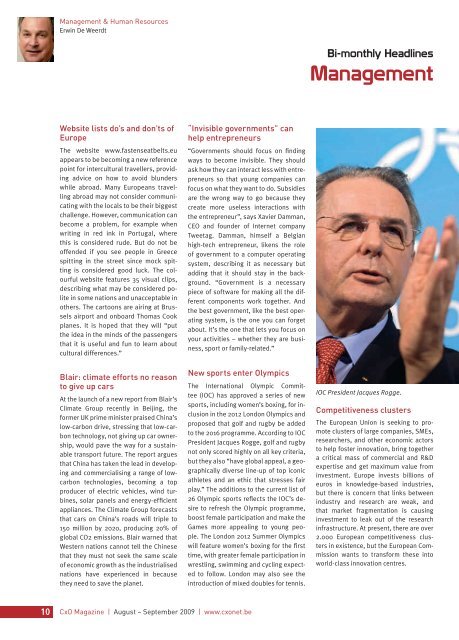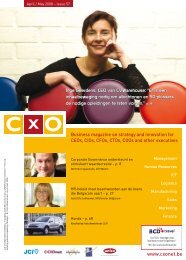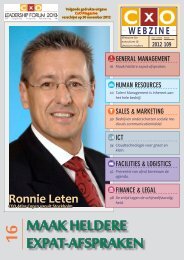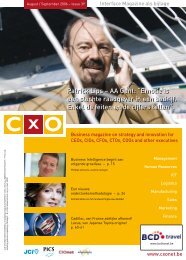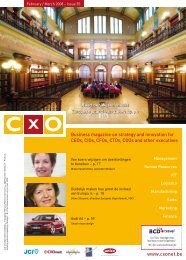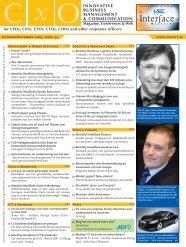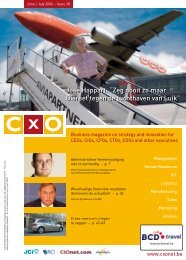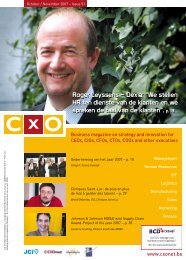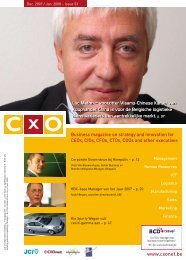Create successful ePaper yourself
Turn your PDF publications into a flip-book with our unique Google optimized e-Paper software.
10<br />
Management & Human Resources<br />
Erwin De Weerdt<br />
Website lists do’s and don’ts of<br />
Europe<br />
The website www.fastenseatbelts.eu<br />
appears to be becoming a new reference<br />
point for intercultural travellers, providing<br />
advice on how to avoid blunders<br />
while abroad. Many Europeans travelling<br />
abroad may not consider communicating<br />
with the locals to be their biggest<br />
challenge. However, communication can<br />
become a problem, for example when<br />
writing in red ink in Portugal, where<br />
this is considered rude. But do not be<br />
offended if you see people in Greece<br />
spitting in the street since mock spitting<br />
is considered good luck. The colourful<br />
website features 35 visual clips,<br />
describing what may be considered polite<br />
in some nations and unacceptable in<br />
others. The cartoons are airing at Brussels<br />
airport and onboard Thomas Cook<br />
planes. It is hoped that they will “put<br />
the idea in the minds of the passengers<br />
that it is useful and fun to learn about<br />
cultural differences.”<br />
Blair: climate efforts no reason<br />
to give up cars<br />
At the launch of a new report from Blair’s<br />
Climate Group recently in Beijing, the<br />
former UK prime minister praised China’s<br />
low-carbon drive, stressing that low-carbon<br />
technology, not giving up car ownership,<br />
would pave the way for a sustainable<br />
transport future. The report argues<br />
that China has taken the lead in developing<br />
and commercialising a range of lowcarbon<br />
technologies, becoming a top<br />
producer of electric vehicles, wind turbines,<br />
solar panels and energy-effi cient<br />
appliances. The Climate Group forecasts<br />
that cars on China’s roads will triple to<br />
150 million by 2020, producing 20% of<br />
global CO2 emissions. Blair warned that<br />
Western nations cannot tell the Chinese<br />
that they must not seek the same scale<br />
of economic growth as the industrialised<br />
nations have experienced in because<br />
they need to save the planet.<br />
“Invisible governments” can<br />
help entrepreneurs<br />
“Governments should focus on fi nding<br />
ways to become invisible. They should<br />
ask how they can interact less with entrepreneurs<br />
so that young companies can<br />
focus on what they want to do. Subsidies<br />
are the wrong way to go because they<br />
create more useless interactions with<br />
the entrepreneur”, says Xavier Damman,<br />
CEO and founder of Internet company<br />
Tweetag. Damman, himself a Belgian<br />
high-tech entrepreneur, likens the role<br />
of government to a computer operating<br />
system, describing it as necessary but<br />
adding that it should stay in the background.<br />
“Government is a necessary<br />
piece of software for making all the different<br />
components work together. And<br />
the best government, like the best operating<br />
system, is the one you can forget<br />
about. It’s the one that lets you focus on<br />
your activities – whether they are business,<br />
sport or family-related.”<br />
New sports enter Olympics<br />
The International Olympic Committee<br />
(IOC) has approved a series of new<br />
sports, including women’s boxing, for inclusion<br />
in the 2012 London Olympics and<br />
proposed that golf and rugby be added<br />
to the 2016 programme. According to IOC<br />
President Jacques Rogge, golf and rugby<br />
not only scored highly on all key criteria,<br />
but they also “have global appeal, a geographically<br />
diverse line-up of top iconic<br />
athletes and an ethic that stresses fair<br />
play.” The additions to the current list of<br />
26 Olympic sports refl ects the IOC’s desire<br />
to refresh the Olympic programme,<br />
boost female participation and make the<br />
Games more appealing to young people.<br />
The London 2012 Summer Olympics<br />
will feature women’s boxing for the fi rst<br />
time, with greater female participation in<br />
wrestling, swimming and cycling expected<br />
to follow. London may also see the<br />
introduction of mixed doubles for tennis.<br />
<strong>CxO</strong> <strong>Magazine</strong> | August – September 2009 | www.cxonet.be<br />
Bi-monthly Headlines<br />
Management<br />
IOC President Jacques Rogge.<br />
Competitiveness clusters<br />
The European Union is seeking to promote<br />
clusters of large companies, SMEs,<br />
researchers, and other economic actors<br />
to help foster innovation, bring together<br />
a critical mass of commercial and R&D<br />
expertise and get maximum value from<br />
investment. Europe invests billions of<br />
euros in knowledge-based industries,<br />
but there is concern that links between<br />
industry and research are weak, and<br />
that market fragmentation is causing<br />
investment to leak out of the research<br />
infrastructure. At present, there are over<br />
2.000 European competitiveness clusters<br />
in existence, but the European Commission<br />
wants to transform these into<br />
world-class innovation centres.


